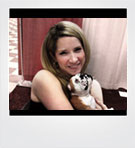 You Are What You Hit: A Guide to Practicing Pool
You Are What You Hit: A Guide to Practicing Pool
Being a good player is all about being armed. Each shot that you own is like a arrow in your quiver, ready for firing at the moment you need it. Owning a shot means that you don't think it'll be successful, you know it will - a luxury that can only be acquired through practice. My confidence is born in my practice sessions. Once I see proof of my own ability and consistency, I'm able to carry it out into the tournament world. As I prepare for the WPBA US Open, this column extolling the virtues of practice is meant to inspire not only you, but also me, to work hard to be ready for the battle!
Drills, drills, drills.
That's right, practice means drills. Little set-up practice games that make you focus on one skill at a time. There are drills out there for every area of the game - you can find them by taking lessons, asking other players, reading books, surfing the web or watching videos.
Drill Misconception #1: That stuff never comes up in a game.
True, the exact layout of a drill is unlikely to appear on league night, but shots requiring the skills you learn from drills will come up again and again until the end of time.
Drill Misconception #2: They make you too technical and stop you from being creative.
Is it opposite day or something? By having a full range of physical skills you'll be more prepared to let go and be a creative, free-flowing player in the heat of the moment.
Have a long-term plan and break it down.
Having lofty goals can give you the incentive to work hard. Break down larger result-based goals (I want to win the US Open!) into smaller, more manageable action-based goals (I want to spend three hours practicing side pocket shots each month.)
Have a short-term plan and stick to it.
Throwing balls onto the table and hitting shots you like for half an hour is unlikely to produce the results you want. Come to the table prepared with the things you want to practice and try to stay on track.
Your new best friend.
Hole reinforcements from the office supply store are invaluable for the consummate practicer. These small, donut-like stickers allow you to place balls in exactly the same spots, quickly and without leaving chalk marks on the table.
Keep it short and not so sweet.
More frequent and intense practice sessions are more productive than occasional, loosely-focused marathons. Be ready to commit your full attention to what you're doing - if you find your mind wandering, take a break or call it a day.
Measure your progress.
Write down the quantifiable results of each practice. Your brain takes time to assimilate new information, so there will be a natural lag-time before you see or feel results. It's easy to get lost in the natural ups and downs of pool - one poopy day can make you want to throw up your hands and quit forever. By keeping track of your practice results over a longer period of time, and not sweating each moment, you'll have a better idea of the real progress that's taking place.
- Home
- Pooldawg Academy
- Liz Ford
- you are what you hit
You Are What You Hit
Posted by : Liz Ford